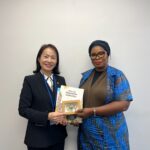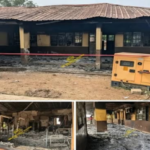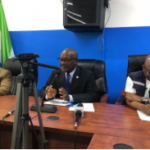By Kadiatu A. Turay
April 9, 2025 Port Loko District, Sierra Leone rolled out its Free Quality School Education (FQSE) initiative in 2018, it lit a spark of hope for rural communities like Mabla, a modest farming village in Port Loko District. The promise was bold: education as a right, not a privilege, for every child. Yet, in Mabla, that vision clashed with a crumbling reality until a local NGO stepped in to bridge the gap.
The village’s lone government-assisted primary school, built in 1986, was teetering on collapse. Its cracked walls, sagging roof, and overcrowded classrooms couldn’t withstand the surge of students drawn by FQSE. Rain seeped through rusted tin, termites gnawed at beams, and pupils squeezed onto splintered benches learning amid chaos. Then, in 2023, the Cotton Tree Foundation turned despair into deliverance.
Once a beacon of progress, Mabla’s school had faded into disrepair, it was an eyesore, said head teacher Foday Conteh. one block, three rooms, six classes we juggled morning and afternoon shifts. It was mayhem. Enrolment soared proof FQSE was working but the building buckled under the strain. Photos from 2022 reveal the grim scene: gaping roofs, crumbling concrete, and children doubled up on seats meant for one.
Parents felt the toll. How can kids learn soaked by rain or fried by sun, asked Hawa Bangura, a mother of three. They’d come home with headaches, not lessons.
The Ministry of Basic and Senior Secondary Education (MBSSE) touts FQSE as a triumph—over two million children enrolled, with 21% of the national budget fuelling the sector. We’re investing in human capital, urban and rural alike, Minister Conrad Sackey boasted in 2024. Yet, in places like Mabla, the sheen of success fades. A 2023 UNICEF report lays it bare over 60% of rural schools need urgent repairs, lacking classrooms, toilets, water, or desks.
FQSE isn’t just fee waivers, said education activist Abu Bakarr Sesay. It’s about safe, equipped schools. If the walls are falling, ‘quality’ is a hollow word.
Enter the Cotton Tree Foundation, a low-profile NGO with a big heart. During a 2023 visit, Program Manager Josephine Kargbo was stunned, over 300 kids crammed into a rotting block some sat on stones, she recalled. We had to act.” In three months, they built a new three-classroom block doors, windows, ventilation and furnished it with desks for 90 pupils. Handed over in early 2024 amid joyous celebration, it was more than a building. We restored dignity, Kargbo said.
Chief Pa Alhaji Kamara beamed at the ceremony. We’d waited decades. Now our children learn in peace. We’re beyond grateful.
For pupils, the shift is seismic. It’s bright and comfy I don’t skip school anymore, said Mariama Kallon, a Class 4 student. Teachers feel it too. “I used to yell over rain or wind, said Madam Isatu Fofanah. Now, teaching’s a joy again.
Community muscle made it real. We hauled sand, stones, water, said youth leader Mohamed Kargbo. It’s our school we had to own it. Experts like Dr. Esther Macauley agree, when communities pitch in, success sticks. It’s partnership, not charity.
Progress shines, but gaps remain. No toilets, no clean water, no library Conteh admits, We’re not there yet. A lean staff of four trained teachers plus unpaid volunteers like Amadu Koroma, who’s taught two years for free, stretch to serve 300 pupils. I just want these kids to have a shot, Koroma said.
For FQSE to thrive rurally, infrastructure must match ambition. It takes everyone government, NGOs, communities,” said district officer Fatmata Kallon. UNICEF’s Dr. James Okoro adds, “Safe schools aren’t optional. We need monitoring to get funds where they’re needed.
Mabla’s tale is a microcosm of grit and grace teachers, parents, and an NGO defying neglect where policy lagged, this is hope, equity, a start, Kargbo said, if Mabla can rise, so can anywhere, each morning, as laughter echoes from new classrooms, a cracked past fade and a village dares to dream.






